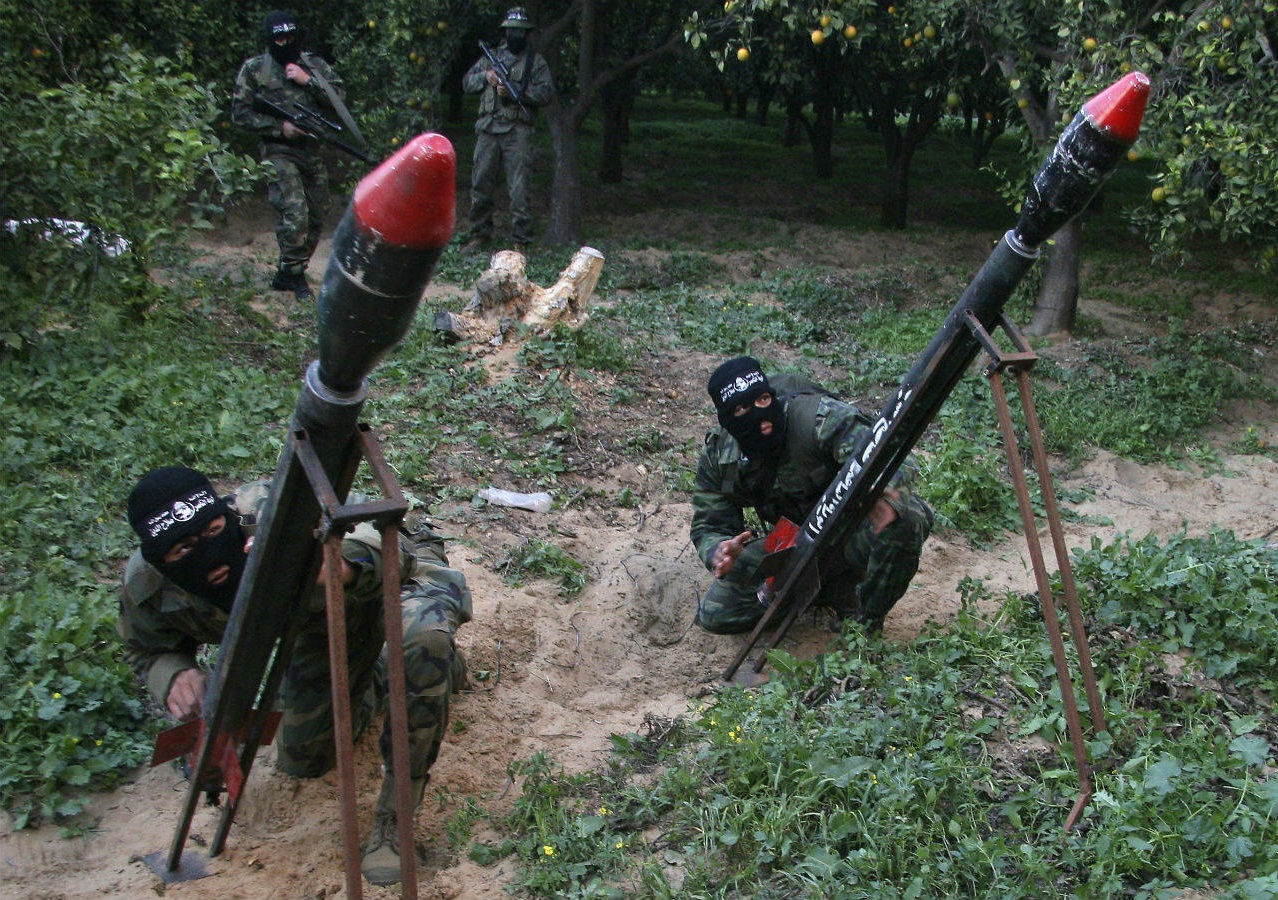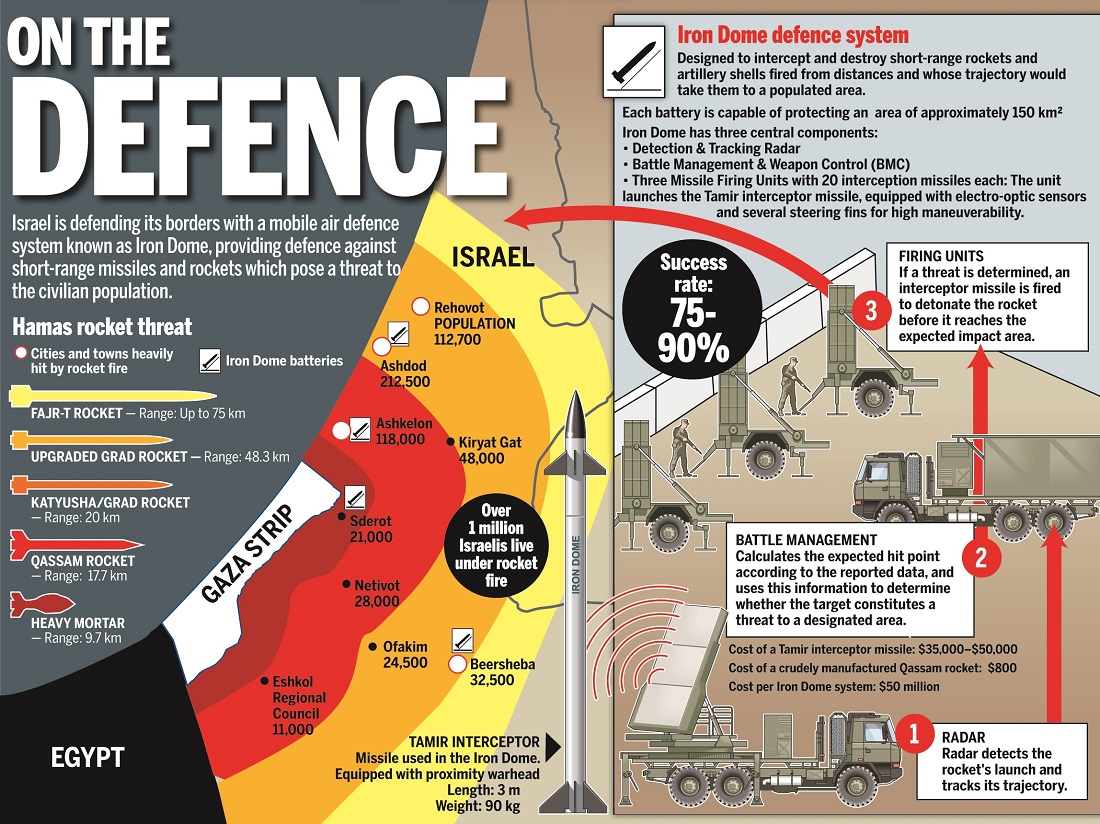On August 16, 2005, Hamas leader Mahmoud Zahar said of the Gaza evacuation that it signifies the “collapse of Zionism” and is “a sign of the final battle that will decide the conflict. It is a defeat for Israel,” he said. “We do not recognize the State of Israel nor its right to control any of the land of Palestine. Palestine is holy Islamic land. Our national problem is not related only to the West Bank, Gaza, and al-Quds (Jerusalem)…but to Palestine, all [the territory of] Palestine.” By that he means Tel Aviv, Haifa, Jerusalem and the rest of what he terms “the Zionist entity.”
Over the past twelve months, Israel has made a significant number of tactical and strategic blunders. The first was the withdrawal from Gaza, the effect of which has been to create a terror statelet on her southern and (soon) eastern borders (if Israeli Prime Minister Ehud Olmert’s “convergence plan” is implemented). The second was in failing to target Hamas leaders more aggressively in the weeks and months prior to the January 2006 Palestinian elections; and the third was in allowing Hamas to participate in Palestinian parliamentary elections recognizing that the terrorist organization would emerge as a credible force in any post-election Palestinian government. These errors have now combined to create an existential threat to the Jewish State and have breathed new life into the global Islamic jihad against the West.
But the election of Hamas is only a symptom of a far greater problem endemic to Palestinian society. A poll of Palestinians conducted between Feb. 8-12, 2006 asked: Do you support or oppose suicide bombings against Israeli civilians? Fifty-six percent (56%) said they support it. This parallels the results of an earlier September 2003 survey conducted jointly by Public Opinion Research of Israel and the Palestinian Center for Public Opinion. That survey found that only 13% of Palestinians agreed with the statement that “Hamas was a terrorist group”; 82% agreed that Hamas was a “freedom-fighting organization”; and a mere 10% believed that bombings targeting Israeli civilians in buses and restaurants could be classified as “acts of terrorism.”
These attitudes suggest that the ethical and moral divide between Palestinian and Israeli culture is so vast that it may have become unbridgeable. Hamas didn’t just get elected by accident nor was its election entirely a reaction to Fatah corruption. It got elected because it represents prevailing attitudes within mainstream Palestinian society. For the Palestinians, terrorism is not a weapon borne of weakness or an act of ultimate desperation (as most Western analysts would have us believe), but rather a strategic choice. As Caroline Glick (writing in the Jerusalem Report) noted: “Terrorism has come to define Palestinian society as much as moderation and humility characterize the now homeless Jews of Gaza and northern Samaria……As the IDF and police passed through the gates of Neveh Dekalim, Palestinian Authority Prime Minister Ahmed Qurei entered the gates of Damascus. There, he met with the heads of Hamas and Islamic Jihad and negotiated an agreement that their forces in Gaza, Judea and Samaria would not be disarmed or harmed in any way. Exiting the meeting with Qurei, the heads of Hamas and Islamic Jihad told reporters that there is no reason for a Palestinian civil war since they share the PA’s strategy. The PA has made its territory one of the safest havens for terrorists in the world…..”
There is a message in all this. Israel is confronted by the first pathologically genocidal society in history whose appetite will not be satisfied until Israel has been vanquished. Each time Israel has made concessions in the pursuit of peace (Oslo, Wye River, Gaza, prisoner releases, withdrawals of IDF forces and pledges of non-assassination of terrorist leaders) it has paid with the lives of its citizens. If Hamas continues its policies of the past as appears to be the case, the Palestinians had best prepare themselves to pay a terrible price for pursuing their dream of conquest.
The Lessons of War
“In every case I can think of,” writes strategist Michael Ledeen of the American Enterprise Institute, “peace has come about at the end of a war in which there was a winner and a loser.” If there is one singular lesson to be learned from human conflicts, it is that “defeat” is much more than the verdict of the battlefield (as America has now discovered in Iraq). It is primarily psychological in nature. Military historian Victor Davis Hanson of the Hoover Institute has written: “Real peace and successful reconstruction are in direct proportion to the degree to which an enemy is humiliatingly defeated (a term, interestingly enough, used by Hamas recently in reference to Israel) – the aim being that an enemy will come to understand that it cannot go on being what it has been.” Only after that moment of realization has been reached can its society be rebuilt. In effect, an enemy must be vanquished and the mindset of the society that produced it must be changed before successful reconstruction can be undertaken.
To understand the concept of “vanquishment”, consider the American civil war experience. “No terms except an unconditional and immediate surrender can be accepted,” Gen. Ulysses S. Grant famously replied to requests for conditions from the trapped Confederate defenders of Fort Donelson in February 1862. Grant’s bluntness was later reflected in President Lincoln’s tough policy toward Lee’s troops after their surrender at Appomattox three years later. The result – the Confederacy was forced to acknowledge defeat, to end slavery, and to recognize the futility of pursuing its dream of an independent Confederate State.
Historically, “vanquishing an enemy” was seen as a critical first step in fundamentally altering its character. Only by eradicating the reasons that we had gone to war in the first place – slavery, fascism, Nazism, Japanese militarism (and now, Islamic terrorism) could real peace follow. In contrast, and with very few exceptions – accommodations, concessions, appeasement, peace processes and negotiations have proven to be no substitute for the absolute and utter defeat of an enemy – especially an ideologically-driven enemy. In fact, the reverse is true. Anything short of vanquishing such an adversary tends to prolong the conflict and ensures that more corpses will pile up later.
“Conversely,” as Daniel Pipes, Director of the Middle East Forum notes “stalemate keep conflicts alive by letting both sides hope to win another day” – a situation where neither side has been totally defeated and the reasons for having gone to war remain unresolved. In this case, it can be argued that neither the Korean War (1953), nor the 1988 Iran-Iraq War, nor the 1991 Gulf War constituted “victory” (in the traditional sense) since the enemy was never (and in the case of Iraq today, has yet to be) vanquished. Furthermore, despite the fact that the Arabs may have been militarily defeated by Israel in the 1948-1949 Israeli War of Independence, the 1956 Suez War, the 1967 Six-Day War and the 1973 Yom Kippur War, the Arabs have never been psychologically vanquished to the point where they accepted the futility of seeking Israel’s destruction.
The Islamists, however, have always understood the concept of “vanquishment.” To them, it is not rhetoric; it is the essence of their struggle against the infidels. But in the post-Vietnam era, the use of American power for anything other than humanitarian missions has come to be seen as malevolent. That is the reason that al Qaeda continually refers to America as a “paper tiger” – too busy counting body bags to pursue its strategic objectives at all costs. Perhaps that is part of the reason why Islamic fundamentalism (what bin Laden has referred to as “the strong horse”) is on the rise across the Middle East, Asia and Africa and why attempts at democratic reform by America (“the weak horse”) in the Arab world are failing. We have forgotten that the purpose of war is to achieve victory and in most cases, victory requires that an enemy be vanquished. It is a tragic commentary on our times but true nevertheless, that we, the educated and cultured children of the Enlightenment may have to descend into the primeval swamp on occasion to utterly vanquish those who seek to destroy us.
Until “the psychology of defeat” has permeated the mindset of an enemy, it is premature to declare “victory” as President Bush discovered to his great regret in the immediate aftermath of Operation Iraqi Freedom. Absolute defeat must emanate from the vanquished. Only then is victory assured. The moment of “defeat” is reached when an enemy (and the society that spawned it) is rendered militarily and psychologically incapable and unwilling to continue the conflict. Only then can its terror apparatus be dismantled; its capacity to wage further war be eliminated; its weapons seized; its weapons factories shut down; its militias hunted down and destroyed; its hate propaganda machine terminated; its educational system reformed; its human and financial resources channeled back into massive social and economic reconstruction, and its population prepared to seek a new and better reality. Only then will a defeated nation choose butter over the guns of war.
Resolving the Israeli-Palestinian Conflict
If the Hamas government continues to execute the policies of its past and continues to foster the Palestinian “cult of martyrdom,” then the Olmert government will have no choice but to pursue it’s defeat – hopefully prior to an Israeli catastrophe, but certainly after one has occurred. You cannot negotiate with an enemy who wants you dead, murders your citizens, attacks your cities, defames your heritage, and declares to the world its intention to conquer your land and force you to submit to its religion.
Faced with a choice between annihilation and survival, Israel will eventually be provoked into taking Hamas at its word. If nothing short of Israel’s destruction will satisfy it, if missiles continue to rein down on Israel’s population and industrial centers, and if suicide bombers continue to penetrate Israeli defenses, then Israel will have no choice but to reoccupy Gaza and the West Bank (at great sacrifice to both Israelis and Palestinians) and remain there (as we did in Europe) until the transformation of Palestinian society is complete. If Hamas cannot (or will not) control its territory, its media, its mosques, its educational system, its militias and end its culture of death and martyrdom, then Israel will make clear to the Palestinians that there will be a terrible reckoning.
The unfortunate historical truth remains that the costlier war becomes, the sooner conflicts end. While this offends our Western sensibilities of tolerance, compromise, negotiation and accommodation, it is nevertheless the tragic truth that lies behind victory. War involves the infliction of pain and sadly, the greater the pain inflicted upon an enemy, the greater the likelihood the conflict will end. From any perspective, war is sordid business, made worse by human imperfections as we have seen at Abu Ghraib and Haditha. It is neither pleasant nor desirable, but in an environment where Palestinian suicide bombers are trained from infancy to hate Jews and are revered as “martyrs,” where Palestinian children play soccer with the decapitated head of a fallen Israeli soldier and have an orgy in the blood of their Israeli victims, where Palestinian mothers celebrate the “martyrdom” of their children, and where Palestinian children are taught a culture of death in their textbooks and summer camps, in their mosques and marketplaces, in their radio and television programs, and on the Internet, war becomes necessary to eradicate the culture that bred that pathology.
It would not have been possible to dismantle the Hitler Youth, the gas chambers or the cult of Aryan supremacy without the complete and utter destruction of all that was the Third Reich. Only that policy allowed the reconstruction of Germany, Italy and Japan after World War II. Only that policy will lead to a definitive end to the Israeli-Palestinian conflict. As William Safire has written: “So long as Arab leaders are convinced that Israel can and will be destroyed, they will keep terrorizing it………..”
A point will be reached shortly, when Israel will be forced to end this war. Just as the creation of free and democratic societies in Germany and Japan after World War II necessitated a comprehensive purge of their existing political, economic, military, social and cultural infrastructures, including the re-education of their entire populations and the rebuilding of their societies from the ground up over many years, so Palestinian society must undergo a profound purge followed by an equally profound metamorphosis that would sweep away the military and psychological infrastructures of genocide and “martyrdom” and sow the seeds for a new Palestinian tomorrow.
If the Palestinians cannot stop the terrorism (or choose not to do so) and push Israel beyond the point of endurance (as was America amid the ruins of 9/11), Israel will be forced by circumstance to do so itself. Golda Meir, a former Prime Minister of Israel, was not far wrong when she said that peace would come only when “the Arabs love their children more than they hate us (the Israelis).” But that state of affairs will not come about through negotiations and concessions with a genocidal society bent on Israel’s annihilation. Like it or not, the Palestinian “death cult” must be extirpated from Palestinian society. That will be achieved only when the Palestinians have been vanquished (as were the Nazis before them) and accept, as fact, that their dream of an Islamic Palestine from the Jordan River to the Mediterranean is futile. If Palestinian society refuses to join the community of civilized nations, then the moment is not far off when it will be forced to do so.
The U.S. administration and the European Union are wrong in their belief that there is “no military solution” to the Israeli-Palestinian conflict. As Michael Ledeen has written: “Peace cannot be accomplished simply because some visiting envoy, with or without an advanced degree in negotiating from the Harvard Business School, sits everyone down around a table so they can all reason together.” In the Arab world, only overwhelming military force (what the Arabs call “hayba” – the awe reflected by an indomitable authority) followed by a re-occupation of the West Bank and Gaza and a return to the pre-Oslo Israeli military and civil administration can change Palestinian society and prevent its slippage back into anarchy, terrorism and a culture that yearns for Paradise through the martyrdom of its children.
Eventually, Israel will be forced to take back the powers that it erroneously transferred to the Palestinian Authority in the Oslo Accords. Before Oslo, Israel controlled the curriculum in Palestinian schools and prevented hate-mongering clerics from preaching in the mosques. Israeli military officers served as mayors in Palestinian cities and the Israeli civil administration assumed control over water and land rights as well as economic activity. A tolerable level of order and security was maintained – unlike today. A return to pre-Oslo would allow Palestinian society to be restructured and rebuilt until such time as the fundamental nature of Palestinian society was changed and a new generation of Palestinian leaders assumed responsibility for the future of their nation.
As was the case in post World War II Germany and Japan, re-occupation would permit massive political and economic reconstruction at every level of Palestinian society. In the end, (if the models of the past apply), the Palestinians would eventually learn to reject violence not because it is politically ineffective, but because it is morally wrong. To achieve that level of understanding may take decades, perhaps a generation, but one thing is certain – only a society freed from the demons of its past can achieve it. Just as Singapore, tiny as it is, has become an economic giant in the world of nations, so too can a Palestinian State become one as well – but only after a Palestinian Reformation has taken place. The scourge of Islamic fascism must be eradicated from the Palestinian mindset. Anything short of that merely prolongs the agony, the Reformation, the reconstruction and a new Palestinian rebirth.



